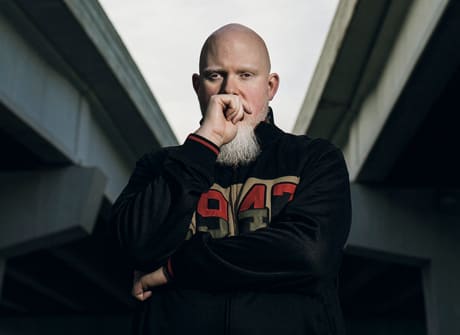In upholding hip-hop's oft-underplayed element of speaking truth to power, even Brother Ali himself isn't sure that the current musical climate is ready for his new studio album, Mourning in America and Dreaming in Color ― an honest, scathing but ultimately buoyant 14-track statement on the current Western world status quo.
"I think they have to be ready. I just make music that reflects how I feel about things," he says. In today hip-hop, there's underground and then there's underground. Celebrated "indie" rapper Brother Ali is the latter. After grinding it out for more than a decade, touring for eight to ten months of the year, and recently experiencing the death of his father and a close personal friend, the Minneapolis-raised artist and practicing Muslim decided it was time for a change.
The project is more than a new album, a new chapter, he says. "The situation our society is going in is not good. More and more middle class people are going into poverty, people are losing their savings, and our society where money is at the centre is affecting our lives, our relationships and our health," he says. "In my own personal life, I've been going through a lot of changes. I took a year off and started becoming a lot more politically active and community-focused, along with [reconnecting] with my spirituality. In order to be genuine and authentic when you're on road and on the road, you have to live real life. And I got to the point where I wasn't living real life anymore."
Working with producer Jake One (of G-Unit fame), and recorded over the course of two months in Seattle, he notes that the project grew from a recent trip to Mecca and closely observing world events such as the Occupy Movement and uprisings in the Middle East. "Jake One really made some of the beats with Rick Ross, T.I. or 50 Cent in mind so the beats ― heavy on horns and drum fills ― definitely reflect that aggressive edge," Ali notes.
"There's used to be a time where hip-hop was addressing these things and that was one of the roles of hip-hop. I believe that's still true, where one of the jobs of hip-hop is to tell the world how we feel."
As the U.S. Presidential election looms this fall ― one that will no doubt define the world outlook for years to come ― he notes he's an informed voter but he's not backing any particular side. And while seeing America as an empire currently on its last legs, Brother Ali still maintains a sense of hopefulness.
""I do believe in hope, the idea that somebody or something out there is keeping track of what's out there and is in control," he offers. "Whether you believe it's God, karma, but some kind of universal law... I believe that if we make sacrifices and strive we can make a difference. But we have to show up for the job, and sacrifice ourselves a lot of the times."
"I think they have to be ready. I just make music that reflects how I feel about things," he says. In today hip-hop, there's underground and then there's underground. Celebrated "indie" rapper Brother Ali is the latter. After grinding it out for more than a decade, touring for eight to ten months of the year, and recently experiencing the death of his father and a close personal friend, the Minneapolis-raised artist and practicing Muslim decided it was time for a change.
The project is more than a new album, a new chapter, he says. "The situation our society is going in is not good. More and more middle class people are going into poverty, people are losing their savings, and our society where money is at the centre is affecting our lives, our relationships and our health," he says. "In my own personal life, I've been going through a lot of changes. I took a year off and started becoming a lot more politically active and community-focused, along with [reconnecting] with my spirituality. In order to be genuine and authentic when you're on road and on the road, you have to live real life. And I got to the point where I wasn't living real life anymore."
Working with producer Jake One (of G-Unit fame), and recorded over the course of two months in Seattle, he notes that the project grew from a recent trip to Mecca and closely observing world events such as the Occupy Movement and uprisings in the Middle East. "Jake One really made some of the beats with Rick Ross, T.I. or 50 Cent in mind so the beats ― heavy on horns and drum fills ― definitely reflect that aggressive edge," Ali notes.
"There's used to be a time where hip-hop was addressing these things and that was one of the roles of hip-hop. I believe that's still true, where one of the jobs of hip-hop is to tell the world how we feel."
As the U.S. Presidential election looms this fall ― one that will no doubt define the world outlook for years to come ― he notes he's an informed voter but he's not backing any particular side. And while seeing America as an empire currently on its last legs, Brother Ali still maintains a sense of hopefulness.
""I do believe in hope, the idea that somebody or something out there is keeping track of what's out there and is in control," he offers. "Whether you believe it's God, karma, but some kind of universal law... I believe that if we make sacrifices and strive we can make a difference. But we have to show up for the job, and sacrifice ourselves a lot of the times."
